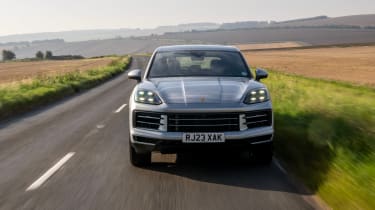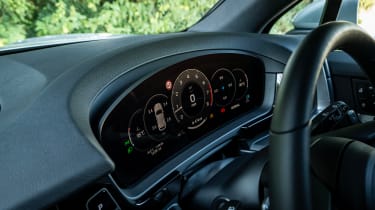Porsche Cayenne – engine, gearbox and technical highlights
Turbocharged V6 and V8 engines make up the range, with and without plug-in hybrid assistance
With the Volkswagen Group’s MLB Evo platform at its core, the Cayenne is related to the Bentley Bentayga and Lamborghini Urus, but that’s not to say all three feel the same to drive. Porsche has instilled the Cayenne with its own dynamic character through bespoke suspension hardware and software tuning, and in the latest model this has been facilitated by two-valve PASM adaptive dampers. With separate valves for compression and rebound, these units are claimed to offer a better ride quality and control, and they’ve been calibrated to offer a wider range of adjustment than before. Steel springs are standard, with two-chamber air suspension available as an option, along with mechanical torque vectoring, rear-axle steering and active anti-roll bars.
The Cayenne’s range of petrol and plug-in hybrid powertrains have received power and efficiency upgrades as part of the facelift, with an eight-speed torque-converter gearbox featuring across the line-up. A 3-litre turbocharged V6 remains in the base car, albeit with a boost to 348bhp and 369lb ft of torque (up by 13bhp and 37lb ft respectively). In the Cayenne E-Hybrid, the V6 is supplemented by a 174bhp electric motor integrated into the driveline for a combined 464bhp and 479lb ft. As well as the power hike, all hybrid Cayennes receive a significantly larger 25.9kWh battery pack in place of the old 17.9kWh unit, enabling a longer electric range of up to 52 miles.
More reviews
In-depth reviews
- Used Porsche Cayenne (2010-2017) review – not the prettiest SUV, but a remarkably capable one
- Porsche Cayenne 2025 review – still the king of sporty SUVs?
Reviews
- Porsche Cayenne GTS Coupe 2024 review – the SUV that might tempt you out of an RS6
- Porsche Cayenne Turbo GT (2021-2023) review – can it take on the Aston Martin DBX707?
- Porsche Cayenne GTS Coupe 2020 review - new GTS upsized to a V8
- Porsche Cayenne Turbo S E-hybrid review - more is more, is less
- Porsche Cayenne Coupe review
- New Porsche Cayenne Turbo review
For the latest model, the Cayenne S effectively replaces the Turbo; its 4-litre twin-turbo V8 generates 468bhp and 443lb ft. Confusingly, the Cayenne S E-Hybrid doesn’t feature an electrified version of this engine, but rather a V6 hybrid setup with 512bhp and 553lb ft.
Next up is the GTS, which takes the pure-V8 S as a base but adds driver-focused upgrades like 10mm lower air suspension, retuned dampers, front axle pivot bearings and more negative camber at the front. Porsche's Torque Vectoring Plus is also included, and the GTS's V8 is uprated to 493bhp and 487lb ft.
Due to tightening European emissions regulations, the stunningly capable Cayenne Turbo GT has been discontinued for the facelift, but it’s been replaced by the altogether more mighty 729bhp Cayenne Turbo E-Hybrid. That colossal output is achieved by combining a 4-litre twin turbo V8 with an electric motor, and while the Turbo E-Hybrid isn’t technically supported by Porsche’s GT division, it is offered with a £21,300 GT Package to convert it into a hardened super-SUV. Exclusively available with the fastback Coupe model, this brings new geometry, bespoke front suspension pivot bearings, a 10mm ride height drop and carbon ceramic brakes, along with active anti-roll bars and rear wheel steering. A carbonfibre roof and diffuser – plus a twin-exit titanium exhaust system – echo the old standalone Turbo GT.
No amount of carbon parts makes a meaningful dent in the Cayenne’s kerb weight though, which stands at 2055kg in its lightest form. Hybrid models push this beyond 2.4 tons – par for the course in this class, but still enormously heavy.




